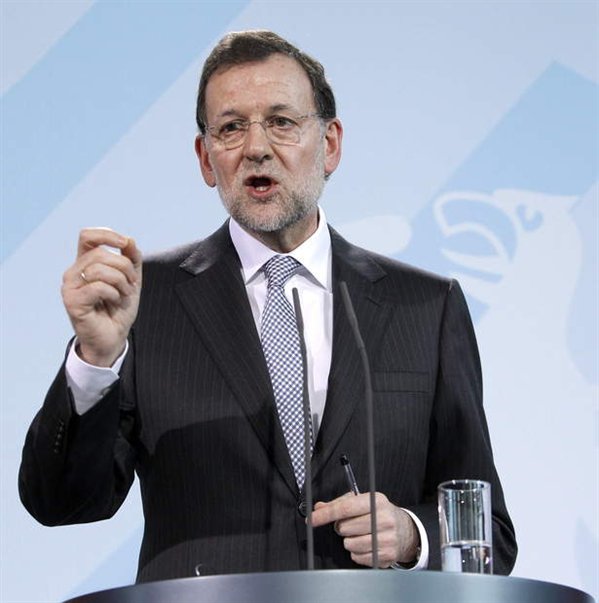
[UPDATE] By Julia Pastor, in MADRID | The Spanish president Mariano Rajoy visited Berlin on Thursday. It was his first official meeting with the German Chancellor Angela Merkel since he was sworn in as president. Against the backdrop of the next January 31 European summit, it was expected that Rajoy would propose Merkel to relax Spain’s deficit ceiling for 2012 and 2013, considering the appreciable cutting of IMF’s growth perspectives for the euro zone. Nevertheless, Rajoy did not dare to. Maybe, because he had the feeling that it was a thorny affair, and did not want to bother his hostess.
As the Berlin correspondent to the digital daily El Confidencial assures in his Friday report
“the discussion about relaxing the deficit goals is taking place just in Spain. Here, in Germany, no politician or foreign visitor is bringing that affair up, since it could even be interpreted as something conflicting with the austerity and budgetary control promises. In other words, the German Chancellor does not need whinings and wailings, much less after her opening speech at Davos: Germany cannot be the rescuer of the euro zone, our partners are demanding us too much, so that we may not even fulfill our commitments.”
On the contrary, another Spanish media outlet such as La Vanguardia, based in Barcelona, has observed in these Merkel’s words a possible open door for recalculating the deficit ceilings:
“There will be a revision of the fiscal pact during the Monday European summit.”
Be that as it may, Rajoy also decided not to mention the equally controversial matters of the eurobonds or the ECB intervention, and devoted his meeting in the cold Berlin to keep Merkel updated about the labour market and financial reforms, as well as the new Law of Budgetary Stability.
Furthermore, the Spanish president took the chance to make three proposals for the euro zone: the possibility of using the EU structural funds surpluses to foster employment policies; the introduction of a capitalisation fund for each employee following the Austrian model, which would protect them in the case of losing their jobs or just changing; and finally, the standardisation of all the European banks’ executive salaries that received state aid packages.
According to the figures given this week by Christine Lagarde, the IMF’s general director, the euro zone’s economic circumstances will worsen in 2012, reaching a GDP growth of just 0,5% compared to the 1,1% previously marked. The expectations for 2013 are not very encouraging either, with GDP at 0,8% against the last calculations at 1,5%.
In this grim European context, Spain’s economy will also follow a negative trend. Lagarde announced that the Spanish GDP will decrease from the expected 1,1% to a recessive figure of -1,7%, in 2012, and from the previous 1,8% to 0,3% in 2013.
But the worst for Spain is not just the warning of this two-year recession but also that the IMF is not sure about Spain’s capacity to fulfill its fiscal consolidation commitments for the same period, since the institution foresees the country’s public debt will close 2012 at 6,8% of its GDP in comparison to the 4,4% level agreed by the former government. Just a week ago, the Spanish minister of Economy Cristóbal Montoro dropped in an interview for FT Deutchland that
“it was desirable and good for Spain reaching the deficit target […] Firstly, we must wait for the next EU growth forecast since the target is based on the 2.3% outdated growth prospect of the former Socialist government.”
In spite of these statements, Rajoy and his economic cabinet have assured all this week long that they are still commited to reach that 4,4% of public deficit.





Be the first to comment on "Why Rajoy did not demand Merkel more flexibility for Spain"